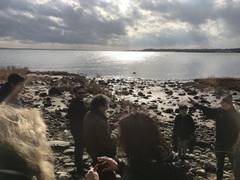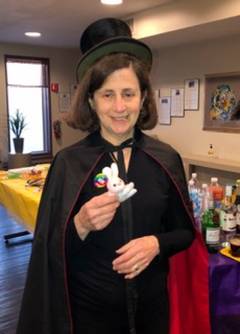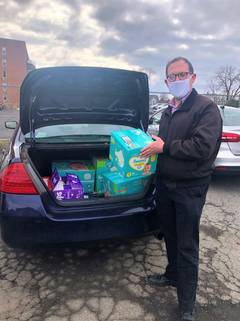Balak 5779: Good Tents, Good Neighbors
07/23/2019 04:06:54 PM
Jul23
| Author | |
| Date Added | |
| Automatically create summary | |
| Summary |
In our Torah portion this week, Balak, we read of the blessings conveyed by the prophet Balaam. Among the poetic verses with which he blesses Israel is the line mah tovu ohalecha ya'akov, mishkanotecha yisrael: How fair are your tents, O Jacob, Your dwellings, O Israel. This line eventually was incorporated into the prayer book, to be said upon entering a synagogue.
But tonight I want to focus on this line in the context of Balaam's blessing. Of all the things about Israel he might have praised, why the tents? And why refer to the people by the name of their ancestor Jacob?
To answer these questions, let us turn to another place in the Torah that mentions Jacob and tents. When Jacob and his twin brother Esau are born, the Torah tells us something of their character: “And the lads grew up, and Esau was a man skilled in hunting, a man of the field, and Jacob was a simple man, a dweller in tents” (Genesis 25:27). In contrast to his outdoorsy brother, Jacob is associated with tents, with the domestic sphere. He is also described as “tam,” which I just translated as simple, but can also have the sense of integrity or innocence.
Suggesting that Jacob is a man of integrity or innocence is a bit ironic, given the story that follows. As you will recall, first Jacob barters his brother's birthright for a bowl of soup. Then he colludes with his mother to deceive his father into giving him his blessing. The whole story creates a picture of a dysfunctional family. It depicts relatives deeply enmeshed in each other's business, trying to out-maneuver each other through eavesdropping, withholding information, and outright trickery. In this story, Jacob's dwelling in tents draws him in to the negative family dynamics that eventually force him to flee for his life.
Compare this to the tents that Balaam observed, of the whole people Israel, Jacob's descendants, “encamped tribe by tribe,” as the Torah says, in the steppes of Moab, preparing to enter the promised land. A common rabbinic interpretation of Balaam's praise of their tents is that the people's tents were so arranged that one family could not peer in to another's tent. This way of arranging the tents allowed the people to maintain a sense of modesty, of private things being kept private.
The people learned from their ancestor Jacob: that dwelling in close proximity to family and kin, with all its benefits, nonetheless requires boundaries. As much as the people cared for one another, in order to function as a cohesive group, one capable of settling the Promised Land, they needed to respect each other's privacy. Like their ancestor Jacob, they dwelled in tents, but found an improved way to do so.
Like Jacob and his family, like our ancestors on the cusp of the Promised Land, we too live in close community, deeply connected with the lives of those around us. This happens through institutions like synagogues and schools, and through organic neighborly relationships. There are obviously many benefits to such a strong sense of community. But such close community comes with the risk that gossip, bullying, and prying into our neighbors' affairs can undermine those relationships, just as they did in Jacob's family.
The image of the people encamped in such a praiseworthy way reminds us of the need to respect boundaries with our neighbors, friends, and fellow community members. We have to resist the urge to gossip. We have to be present and helpful for our friends, without interfering in their lives in an unwelcome way.
It is so wonderful to be here together tonight, as two congregations and more coming together in celebration of Shabbat. This service reminds us of the great blessings that community can bring. May we always be mindful, as were our ancestors, of maintaining the boundaries that enable such community to thrive. Shabbat Shalom.
Thu, November 6 2025
15 Cheshvan 5786
Photo Gallery
Photo Albums
Thu, November 6 2025 15 Cheshvan 5786
Upcoming Events
All Events
-
Friday ,
NovNovember 14 , 2025Give Thanks at Tot Shabbat 2025
Friday, Nov 14th 5:30p to 6:30p
-
Tuesday ,
NovNovember 18 , 2025Women's Rosh Chodesh Group
Tuesday, Nov 18th 12:00p to 1:30p
New Women's Rosh Chodesh Group Tuesdays, 12:00-1:30pm Gather with Cantor Sklar and KTI friends at the start of each month of the Hebrew calendar to learn about the themes and traditions of the coming month. Learn from each other, learn more about each other and better understand the women within our tradition. Enjoy music and lunch together! Please a dairy or parve lunch to enjoy at noon, followed by the discussion at 12:30pm. KTI will provide drinks and dessert. RSVP Appreciated -
Wednesday ,
NovNovember 19 , 2025Rabbi, May I? Modern Responsa
Wednesday, Nov 19th 10:00a to 11:30a
Wednesdays, 10 - 11:30 AM, KTI Library Ever since Abraham’s famous argument with God, Judaism has been full of debate. Moses and Korah, David and Nathan, Hillel and Shammai, the Vilna Gaon and the Ba’al Shem Tov, Spinoza and the Amsterdam Rabbis . . . the list goes on. No wonder that Judaism cherishes the expression machloket l’shem shamayim, “an argument for the sake of heaven.” Beyond their historical importance, what makes these disputations so compelling is that nearly all of them, regardless of their epochs, are still being argued. The parade of characters spanning three millennia of biblical, rabbinic, and modern disputation reflects the panorama of Jewish history with its monumental political, ethical, and spiritual challenges. This series will examine Jewish responses to exile from the biblical period to our modern day. Considering texts from all genres of Jewish literary creativity, we will explore how the realities and iterpretaions Join as we re-open these timeless debates that lead us to the core of 3,000 years of Jewish conversation. • Justice: Abraham vs. God (October 19) • Holiness and Authority: Moses vs. Korah (November 9) • Inclusion: The Five Daughters vs. the Twelve Tribes (November 30) • Accountability and Morality: David vs. Nathan (December 21) • Resistance: Ben Zakkai vs. the Zealots (January 18) • Law: Hillel vs. Shammai (February 15) • Spirituality: The Vilna Gaon vs. the Baal Shem Tov (March 15) • Boundaries: Spinoza vs. the Amsterdam Rabbis (April 19) • Religious Evolution: Geiger vs. Hirsch vs. Frankel (May 10) • Zionism: Herzl vs. Wise (May 31) -
Wednesday ,
NovNovember 19 , 2025Wrestling with God
Wednesday, Nov 19th 8:00p to 9:30p
Wrestling with God Wednesdays, 8-9:30 PM Congregants’ homes TBA We need to talk about God. And about how we talk, and don’t talk, about God. It’s a big topic, maybe the biggest. This offering invites adult learners into compassionate inquiry, deepening their relationship to Jewish text through collective exploration. Using the album s*ngs ab-ut g?d [https://open.spotify.com/album/6JEY2AN6awAxNfWwmXX460] by Jewish educator Eliana Light as a starting point, this series blends music, Hebrew text study, and open-ended questions to help participants examine their own connections to the divine. This is sacred work. It’s not about getting it right. It’s about showing up with curiosity, humility, and a willingness to join the long lineage of Jews who wrestle with God. Each session stands alone, but we’d love to have a consistent group as much as possible. Dates: September 10: skyman October 22: shadows November 19: in the silence December 10: if only January 21: lead me back February 11: three steps March 11: beyONEd April 29: the mountains May 20: the name June 17: I rise -
Thursday ,
NovNovember 20 , 2025Coffee with the Rabbi
Thursday, Nov 20th 8:00a to 9:00a
Start your morning with some caffeine and casual or meaningful conversation! Join Rabbi Goldberg for a Coffee Chat! Stop by Rye Ridge Starbucks any of the following Thursdays, between 8-9am: June 12 and 26 July 10 and 24 August 7 and 21 September 4 and 18 October 16 and 30 November 6 and 20 December 4 and 18
Privacy Settings | Privacy Policy | Member Terms
©2025 All rights reserved. Find out more about ShulCloud






